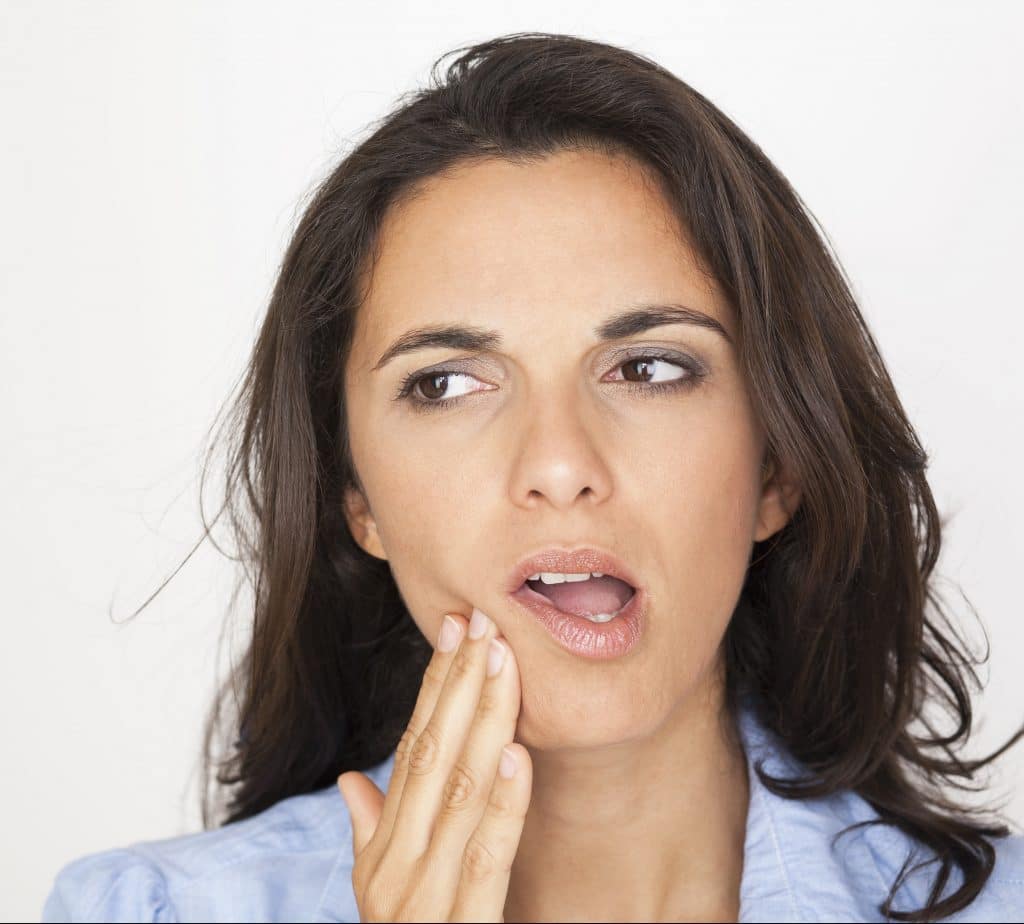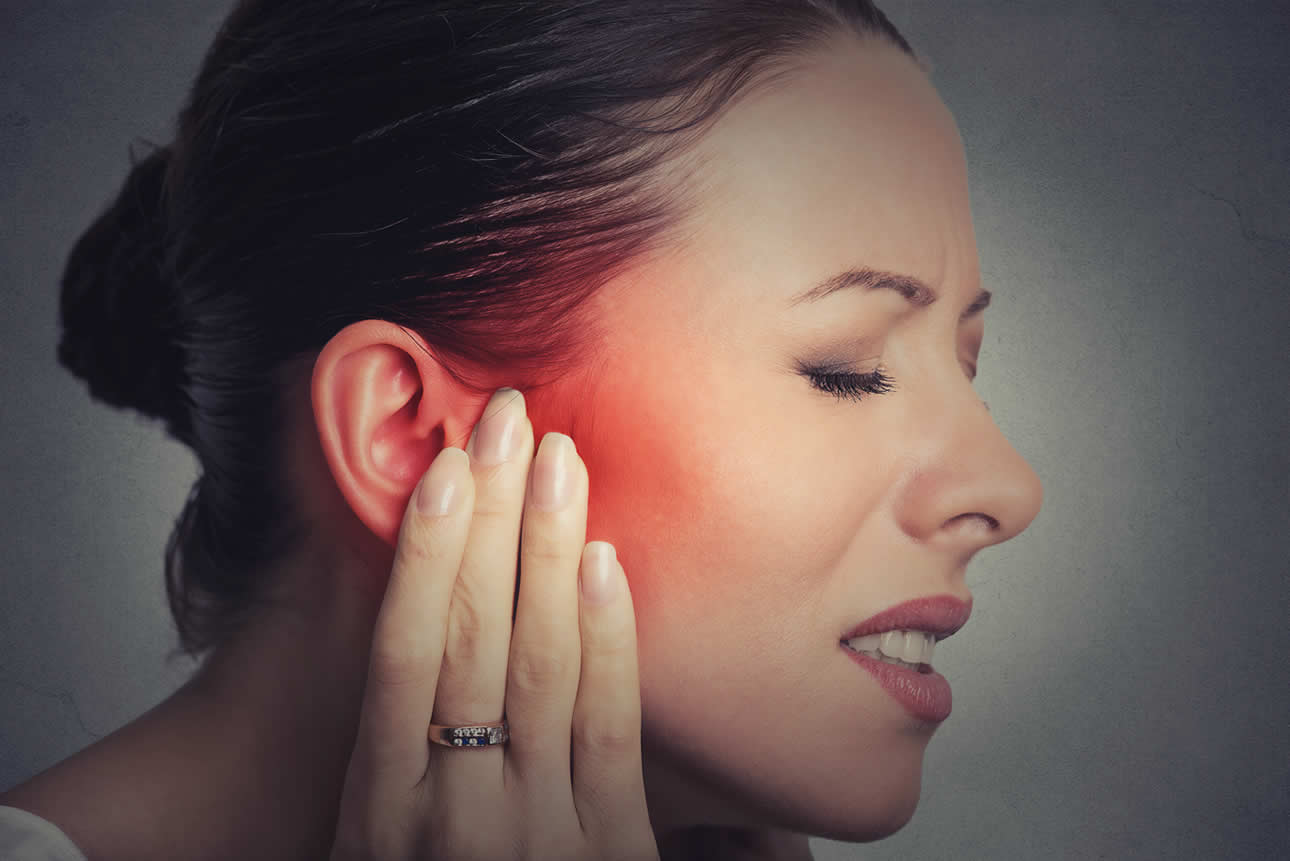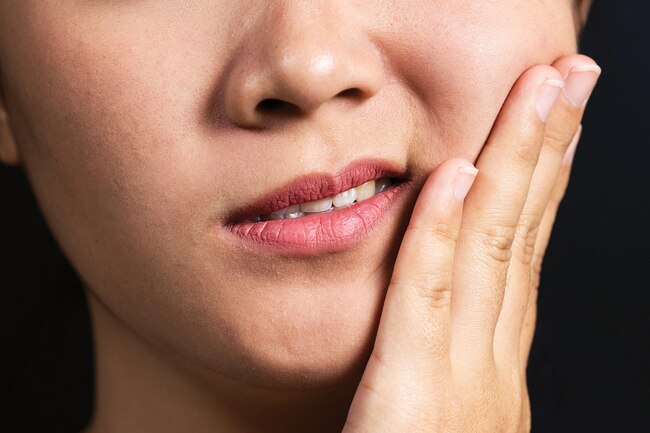If you’re a boxer sparing in preparation for a heavyweight fight, sure it’s normal to have jaw pain. But when you’re sitting reading a book, and you have pain in your jaw, that’s a bit more unusual. So if you’re sitting there and wondering, why does my jaw hurt, this ones for you. We’ll talk about jaw pain from mild to severe, we’ll talk about the common causes of jaw pain, and some of the more rare ones as well.
Common Causes of Jaw Pain
When you have any type of pain, most people’s minds wander to the “what if.” What if this was something really bad? And if you’re feeling that way, deep breath. That’s a normal reaction. However, you should know there are several common causes of jaw pain, many of which are easily treated.
Here’s a look at the most probable causes of jaw pain. I recommend going down the list to rule out each of them in a top-down order.
Teeth or Gum Problems

A large part of our jaw that is exposed to the elements involves our teeth and gums. If you’re having pain in your jaw, one of the first things you should rule out is if it is caused by a dental issue.
If it’s been more than a day or two of jaw pain, you should review with your dentist if there was anything they were “watching” from your last visit that would cause your jaw to hurt. And if it’s been more than 6 months since your last dental visit you should plan to schedule a visit to have a check up.
Here are some dental problems that could cause your jaw to hurt and the red flags of symptoms associated with each:
- Tooth Decay, aka cavities
What to look for: sensitivity when chewing, tooth pain that lingers with hot or cold foods, sensitive teeth
- An Infected Tooth, aka dental abscess
What to look for: throbbing sensation of a tooth, tooth pain that lingers with hot or cold foods, a persistent bad taste in your mouth, swelling of the gums that can also affect the outside of the face
- Eruption of the Wisdom Teeth
What to look for: pressure behind the farthest back molars, jaw pain that radiates to the ear, a persistent bad taste in your mouth, swelling of the gums that can also affect the outside of the face
- Periodontal Disease
What things to look for: bleeding gums, sore gums, persistent bad taste in your mouth, bad breathe
- Recent Trauma to the Teeth or Jaw
What to look for: sensitive teeth, darkening of one or more teeth, ulcers in your mouth
TMJ Disorder

Your lower jaw is connected to two points on each side of your head which is called the Temporomandibular joints (TMJs). The lower jaw opens and closes like a hinge, while the upper jaw is fixed in place. The teeth serve as a puzzle piece for upper and lower jaw to rest on one another. All these parts working together are considered the TMJ complex.
Because the TMJ complex has multiple components that all must work in harmony together, you can understand that a slight imbalance can create strain in many different areas.
That is concept is the reason TMJ disorder causes over 10 million Americans’ jaws to hurt.
But because TMJ disorder is affects multiple parts of the head and jaw, its often linked to jaw pain but also more symptoms as well. Let’s look at some of the most common symptoms associated with TMJ disorder:
- Soreness of your jaw on one or both sides
- Frequent headaches
- Earache
- Teeth clenching and grinding
- Fatigue when chewing
- Pain, clicking, or popping when opening or closing your mouth
- Jaw lock
But when it comes to conditions, most people want to know the cause.
What caused this doc? That’ whats on most people’s minds. But the thing about TMJ disorder is that multiple factors can contribute to the condition. TMJ disorder sometimes can be linked to a specific cause, but not always.
Most people with TMJ disorder have some degree of lack of harmony in their TMJ complex. The amount of symptoms depends on how sensitive the particular person is to jaw disharmony.
Some factors that disrupt the harmony of the TMJ complex and cause the jaw to hurt are:
- Misalignment between the top and bottom teeth
- Accidents or trauma to the jaw
- Arthritis
- Over development of the muscles of the jaw
- Dental work that changes the bite
- Neurological issues
- History of abuse or post traumatic stress disorder
If you have some symptoms of a TMJ disorder that are irritating you, talk to your PCP or dentist for guidance. Some dentists and physicians have knowledge of TMJ disorders, but not all. Depending on the severity, they may refer you to a TMJ specialist with expertise in the area of TMJ.
Sinus Issues

It can be hard to believe that the answer to why does my jaw hurt can be the sinus. But it can be.
If you’re having soreness of the upper teeth and the upper jaw, there is a chance your jaw pain could be sinus related. You have to remember that the sinuses are immediately above the upper jaw. So any pressure in the sinus from congestion can feel like jaw or tooth pain. The technical term for the condition is called sinusitis.
Jaw pain from sinusitis usually lingers for 1-2 weeks after having a cold or major allergy congestion.
Other symptoms to hint that your jaw pain might be from sinusitis include:
- nasal congestion that makes it hard to breathe through your nose
- mucus in your nose or throat in the past 2 weeks
- facial pressure when leaning over
- pressure and pain in your ears and head
- fatigue
- difficulty smelling or tasting
Jaw pain from sinusitis often clears up on its own, but if it lingers for more than 1-2 weeks you should consider checking with your healthcare provider to review and potentially consider an antibiotic prescription.
Why does my jaw hurt? Do I need to be concerned?

Generally, no. Jaw pain usually isn’t cause for an emergency panic. But there is one caveat.
Jaw pain can also be an early sign of a heart attack.
Now before you go panicking, it’s relatively rare and it’s usually accompanied by other clear symptoms that would indicate that its cardiac related. Studies estimate that 10% of people having a heart attack have jaw pain or pain in the throat as one of the first symptoms.
Some symptoms of a heart attack that accompany jaw pain are:
- Pressure or pain in your chest
- The feeling of heartburn or indigestion
- Difficulty catching your breath
- Nausea, vomiting, and stomach pain
- Extreme fatigue
- Dizziness and lightheadedness
- Cold sweats
These symptoms can develop suddenly or come on slowly, over several hours or days. If you sre having pain in your jaw and it is accompanied by some of the above symptoms, you should seek emergency care immediately.
My Jaw Hurts: Top Tips for At-Home Relief
When your jaw hurts its often not enough to warrant immediate medical attention, but bad enough that it is upsetting. If you have mild or temporary pain in your jaw, that has just flared up, you may want to first consider treating it at home to see if it improves shortly. If you do not have any swelling and the underlying cause isn’t serious, the jaw pain may improve on its own.
Here’s some tips to help manage jaw pain and evaluate for improvement day by day:
- Try a warm compress. If you think your jaw soreness could be TMJ or muscle soreness, try heat. Heat helps relax the muscles and helps the body shuttle away inflammation. Warm a small dish of water in the microwave, and dab a facecloth into it. Make sure its not too hot, and apply to the sore area as needed.
- Be sure to stretch. Just like stretching before exercise is important, who would think to stretch before chewing a steak? The reality is that stretching our jaw muscles periodically is beneficial to help relax them and keep them functioning optimally throughout the day.
- Try over the counter anti-inflammatory medications. Ibuprofen and other over-the-counter pain medications can help relieve pain and inflammation temporarily. Be sure to follow the dosage instructions on the package and check with your healthcare provider if you are not having relief after a few days.
- Rest. That’s often a new concept for many of us. Resting. Rest not only your jaw but your entire body. Try to get extra sleep and choose nutritious foods that aren’t tedious to chew.
- Try massage. Gently massage the area of the jaw that is sore periodically throughout the day. Studies show that massage increases blood flow the areas, can aid healing, and can decrease pain.
- De-stress. Stress has a big effect on our muscle tension, particularly in the jaw. You may be subconsciously clenching and grinding due to stress. Try to test to see if stress is related to your jaw pain and if your jaw hurts more frequently during stressful times.


